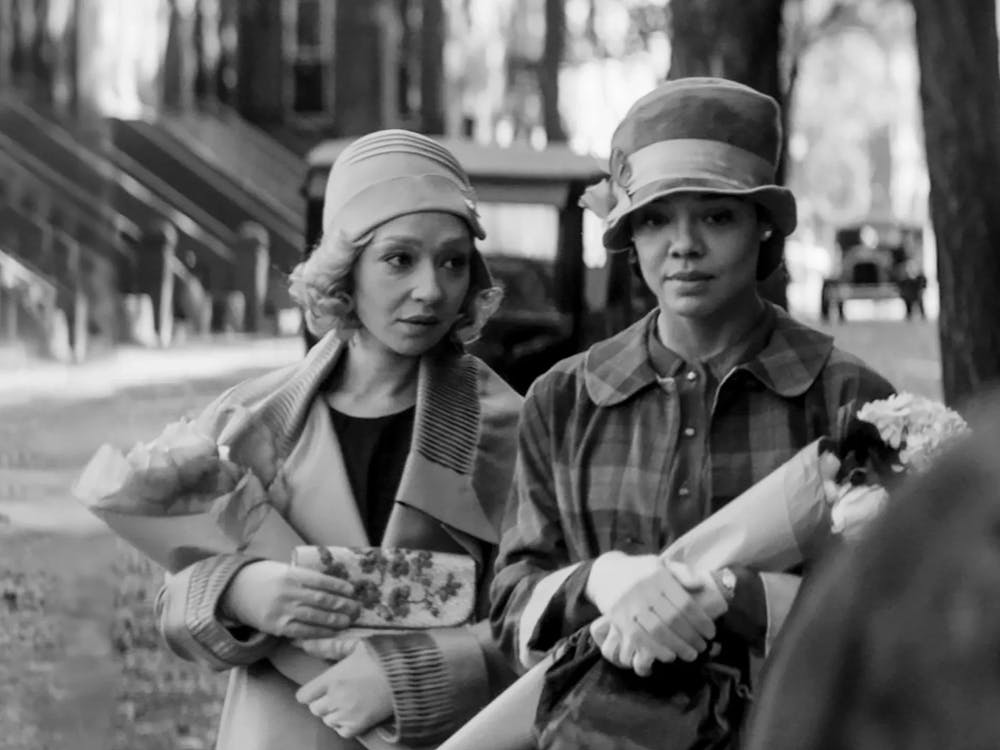Is race just something we are all performing? This question is explored, though not exactly answered, in the most recent film in the Hirschfield International Film Series, “Passing.”
Set in 1920s New York City, “Passing” is a black and white film adapted and directed by Rebecca Hall from Nella Larsen’s 1929 novella of the same name. The film ruminates on colorism and identity politics through the story of Irene Redfield (Tessa Thompson) and Clare Kendry (Ruth Negga), two Black women, one of whom (Clare) is white passing.
The film opens on a hot day in the city. To escape the heat, Irene ducks into a hotel intended only for white patrons and runs into her childhood friend Clare, who now lives as a white woman and has married a white man. When the two return to Clare’s room to catch up and order room service, Clare’s racist husband John enters. He proceeds to make derogatory remarks about Black people, assuming he is in like-minded company. He jokingly remarks that he calls Clare a shortened version of the n-word because she’s “been getting darker and darker every year [they’ve] been together.”
The stress and suspense of the scene is heightened by the fact that Irene’s face is barely visible, sheltered by the brim of her hat, unintentionally shrouding her skin color. The lighting choices are impeccable and the black and white cinematography brings into question the viewer’s ability to discern race based solely on skin pigmentation. This sinister encounter in the hotel is Irene’s only experience in passing as white, but in this moment, it becomes clear that both women are passing in John’s eyes.
While the phenomenon of passing has present-day implications, it is imbued with historical understandings and definitions of race in America. The term passing was used between the 18th and 20th centuries in the U.S. to refer to mixed race people, often of both Black and white ancestry. Due to their light skin complexion or other physical traits, they were able to pass as white. Particularly in the South, this at one point meant the possibility of escaping life as a slave and later, the ability to breach the constraints of the Jim Crow era. Although passing created an opportunity to live a more free life, it also often came with shame and isolation from so cleanly cutting ties with one’s community. The body of passing literature and media has grown in recent years, and this film presents many similarities to Britt Bennett’s 2020 bestseller “The Vanishing Half.” Bennett’s novel tells the story of identical twin sisters born in the 1940s in small-town Louisiana who go on to lead drastically different lives, as one of them marries a Black man and lives as a Black woman while the other lives as a white woman. “Passing” builds on this body of passing narratives, blurring the perceptions of performance, emotion and identity when it comes to the construction of race.
After the tense interaction with Clare’s husband, Irene hastily leaves the hotel to return to her Harlem home. This complicates their relationship, leaving Clare longing to approximate herself again to Black people and Irene equal parts frustrated and confused. After writing to Irene without response, Clare shows up at her brownstone, distressed at her apparent rejection. Justified in her anger, Irene expresses the disgust she felt in John’s company, causing Clare to burst into tears. This scene plays on the trope of white tears and white victimhood, though Clare is technically not white. Again, Hall sows another seed of doubt, asking us as viewers whether to pass is to become or only to play a part. In her assumed identity, Clare can cry when she feels threatened and expect the comforting of her Black female counterpart. Unsurprisingly, they make up.
Clare’s arrival into Irene’s life causes both internal and external turmoil which the storyline follows through changing seasons. Thompson and Negga are excellent in their roles and the anxieties they experience from the weight of Clare’s secret are palpable. Clare’s desire to partially reintegrate or at least to spectate the Black community of New York takes its toll on Irene, on whom much of the burden falls, both in inviting Clare back into that world and in holding onto her secret. Irene and her husband, Brian, bring Clare to a charity event for the Negro Welfare League, creating a stir as people fawn curiously over the white beauty the couple brought along.
Irene exhibits out-of-character slyness when she reveals Clare’s secret to a white writer friend Hugh (Bill Camp). Upon hearing this, Hugh is prompted to ask Irene several questions, getting at the heart of the issues being raised. First, he wonders why, if Clare has successfully evaded her identity, she would come to an event with the very people she is trying so hard not to be. He then ponders why she would choose to live as a Black woman if she could pass as white, a notion that is both insulting and telling. Hugh, who considers himself an ally to the Black community, is grossly naive in assuming that to pass as white is a simple choice.
Hall’s impetus to adapt and direct this story came from personal motives. She has been acting since she was a child and made her directorial debut in this film. Hall, like the characters in her movie, passes as white. Her mother is opera singer Maria Ewing, who was born in Detroit in 1950 to a white mother and a father of both African and European descent. Growing up, Ewing often passed as white because of her light complexion. Hall has spoken in interviews about the internalized legacy of shame that comes with passing both in her own family and more generally. “I think in any family that has a legacy of passing, it’s very tricky, because, sadly, you inherit all of the shame and none of the pride,” said Hall in an interview with The Guardian.
If you missed the Hirschfield screening, “Passing” is also available on Netflix.



